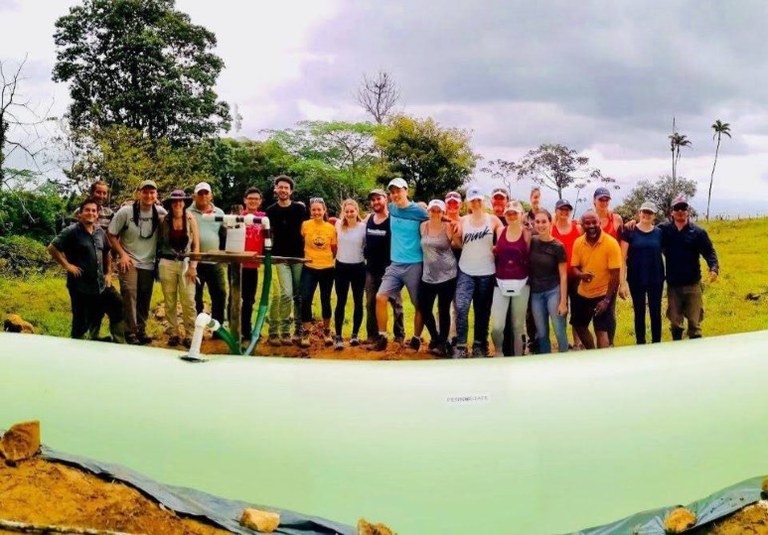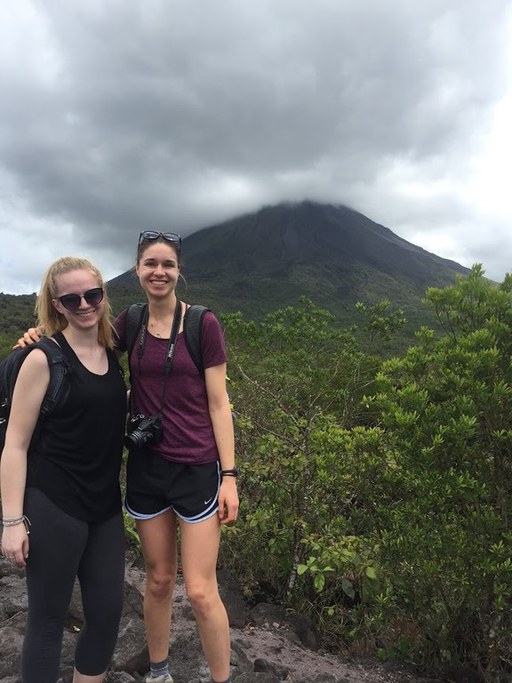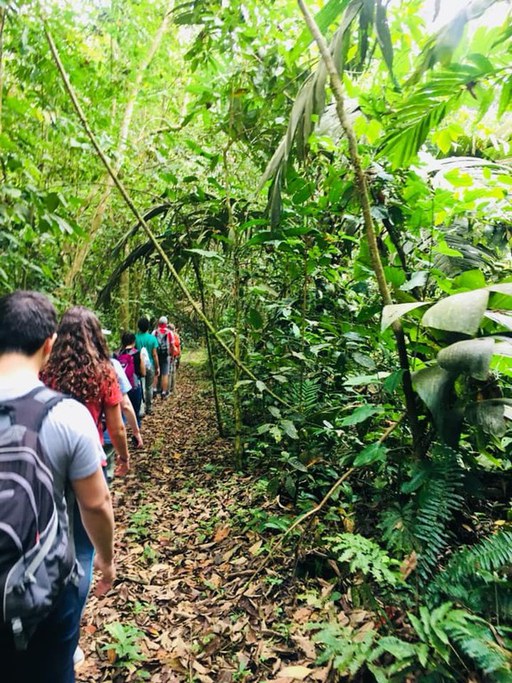Posted: May 28, 2019
UNIVERSITY PARK, Pa. — Nora Tietjens explored a different type of classroom when she and a group of fellow Penn State students traveled to the tropics over spring break as part of the embedded course “Environmental Resource Management 499: Costa Rica Sustainable Agriculture and Natural Resources,” offered in the College of Agricultural Sciences.

Penn State students who traveled to Costa Rica over spring break as part of the embedded course “Environmental Resource Management 499: Costa Rica Sustainable Agriculture and Natural Resources” helped a rural Costa Rican farmer build a biodigester, which
For Tietjens, of Huntingdon, a sophomore majoring in food science, this course meant not only traveling to a new country, but also flying on an airplane for the first time.
"Coming from never leaving the country to visiting EARTH University -- and being able to meet and talk with students my age who are studying the same kinds of subjects -- was incredible, and definitely a culture shock," she said.
Flying for the first time opens opportunities for students such as Tietjens to learn on a global scale, explained course instructor Tammy Shannon.
"Understanding other countries' cultures and customs, and their environment and natural resource issues, offers students a chance to see the world from different perspectives through the people themselves," Shannon said.
During the semester, students in this embedded course learn about topics such as climate change and sustainable farming, and during spring break they employ their knowledge alongside small-scale farmers from Costa Rica. This opportunity not only allows them to experience another culture, but also to see how agricultural methods differ from those practiced in the United States.

Nora Tietjens, right, and Ashley Moll, stand in front of Arenal Volcano after hiking the lava flow trail. Both traveled to Costa Rica over spring break as part of an embedded course in environmental resource management.
IMAGE: Penn State
"In my food science classes, we've learned how you make chocolate from bean to bar, and we've done that in the lab," Tietjens said. "In Costa Rica, it was interesting to see the same process but with traditional methods. They didn't have fancy machines but still made the same products."
She noted that one of the traditional methods used on Costa Rican farms is called winnowing, which describes separating the shell of a cacao bean from the nib, or the small part that is used to make chocolate. Whereas many large-scale chocolate manufacturers use machinery to expedite the labor-intensive process of winnowing, smaller farmers often accomplish this by lightly blowing on the crushed-up beans to remove the lighter shells.
"It was really hard, because you had to get your breath just heavy enough that it would blow out what you didn't want, but not so heavy that it would blow everything out and you would lose all of your work," said Tietjens.
Students also used their lessons about biorenewable systems to help a rural Costa Rican farmer build a biodigester, which captures methane gas to help fuel his farm. This service project brought their course content full circle, taking classroom lessons and turning them into practical hands-on experience.
In addition to implementing their skills from the classroom, the students gained insight into the way Costa Ricans and other students at EARTH University conceptualize food compared to Americans.

Penn State students hike along a trail in Costa Rica as part of the embedded course "Environmental Resource Management 499: Costa Rica Sustainable Agriculture and Natural Resources."
IMAGE: Penn State
"There's so much to do with how people eat and the traditions and culture around it," Tietjens said. "It's so different anywhere you go. It was cool to see that in action in Costa Rica. They eat foods that we consume here, but it's a totally different experience with completely different attitudes."
The students also held roundtable talks at the open-air cafeteria at EARTH University with students from Costa Rica, Colombia and Africa, discussing sustainable agriculture and climate change. According to Shannon, these conversations revealed that despite the students' various global origins and agricultural practices, they all shared a deep concern for sustainability and acted on these concerns in creative ways. Examples were Penn State students building a biodigester and an African student turning a buffalo farm into an ecotourism site.
Each year, students taking the course have remarked that the trip greatly impacted their lives.
"Many see the world as a much smaller place after returning home," Shannon said, adding that the students also benefit from growing closer to their classmates through this once-in-a-lifetime experience.
"Before the trip, we sat next to each other in class but never really talked," Tietjens said. "I didn't know anyone by name. But then we became so close on the trip -- everyone became a member of a nice, tight-knit family. After the trip, we came back to class sitting in the same seats, but we knew everyone and had all these fun stories and memories together."
The environmental resource management program offers embedded courses that take students to places such as Chile, New Zealand and China. For more information about these course offerings, visit https://agsci.psu.edu/international/study-abroad/current/short-term-agsci-ieee or contact Shannon at tmb5352@psu.edu. By Natalie McCollum
Ag Sciences Global
Address
106 Agricultural Administration BuildingUniversity Park, PA 16802
- Email globalag@psu.edu
- Office 814-863-0249
- Fax 814-865-3055
Ag Sciences Global
Address
106 Agricultural Administration BuildingUniversity Park, PA 16802
- Email globalag@psu.edu
- Office 814-863-0249
- Fax 814-865-3055

